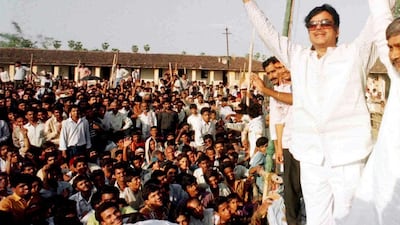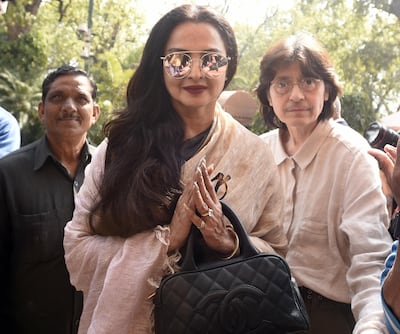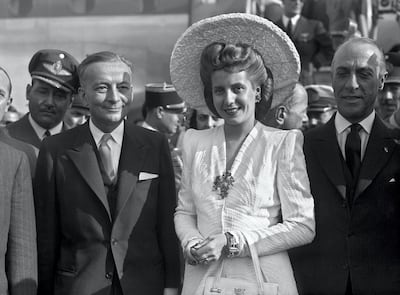Three weeks ago, the Indian National Congress party, which is hoping to make a comeback in the ongoing general election, fielded Urmila Matondkar, a Bollywood star whose heyday was in the 1990s, as a candidate for the Mumbai North constituency.
While the choice surprised many, the crowds that she attracted at her rallies in the metropolis once again highlighted the relationship Bollywood shares with Indian politics. Not only do Bollywood celebrities bring much-needed star power to a political campaign, but in a star-struck nation, the oratory skills of these actors amplify the policies a party is hoping to push to the public.

For a political stage as fevered as India’s, showbiz is not merely tinsel to throw at the electorate – it is a necessary component of a syntax through which parties touch base with the public.
Stars from the Socialist Era
Aside from the obvious lure of glamour, Bollywood shares a historical connection with Indian politics. In the pre-internet era, films and film stars were an ersatz social media, before social media existed.
In the 1960s, Prithviraj Kapoor, the patriarch of Bollywood's first family, the Kapoors, was the Hindi film industry's first entry into Parliament as a nominated member of its upper house (Rajya Sabha). In fact, in socialist India, led by Pandit Jawaharlal Nehru, India's first prime minister, the film stars who were most revered were those who reflected the nation's agrarian zeitgeist.
Likewise, Raj Kapoor, often referred to as "the Charlie Chaplin of India" for his depictions of a downtrodden chap who could suffer his plight with a smile, was a favoured mascot for the Indian National Congress, and India's delegations abroad. In the Cold War era, he even found many fans in Communist Russia. Similarly, Nargis Dutt, who famously portrayed the titular character in Mother India (1957), a blockbuster about a poor woman who fights the odds to raise two children in rural India, became so popular that she was nominated to the Rajya Sabha in 1980-1981. After her death from cancer, her husband, Sunil Dutt, who portrayed her son in Mother India, also joined politics in 1984.
That ‘70s Show
It is not merely superstars who played farmers or villagers who have dabbled in politics. Actors from urban blockbusters of the 1970s and 1980s are very much fixtures in the nation's political landscape. Amitabh Bachchan, Shatrughan Sinha, Dharmendra, Vinod Khanna, Hema Malini, Rekha, Jaya Bachchan and Mithun Chakraborty have all been parliamentarians after their heyday in B-town. Of these, perhaps the most baffling case is that of Amitabh Bachchan.

India's reigning mega-star in 1984, he contested elections that year, cajoled by his close friend Rajiv Gandhi, then India's prime minister. Bachchan seemed set for a long innings in New Delhi, however, his stint in politics was surprisingly short-lived, and he fell out with the Indian National Congress. In the 1990s, however, when Bachchan went bankrupt, Amar Singh from the Samajwadi Party bailed him out – and Bachchan became a mouthpiece for the party. However, over time, even his friendship with Singh soured. Clearly, despite his mass appeal, politics and Bachchan are a bad combination. His wife, however, has made good in the political arena: she has been elected four times since 2004 to the Rajya Sabha as a member of parliament. Likewise, Rekha, his co-star in many successful films from the 1970s, has also been nominated as a Rajya Sabha MP since 2012, albeit to much criticism. According to a report by Factly.in, a data journalism portal, she was cited as one of "the worst performers in attendance" in the Rajya Sabha.
Perhaps the most successful from the 1970s-1980s Bollywood brigade has been Sinha, who hails from the historically downtrodden state of Bihar. In 1992, he famously contested elections as a BJP candidate against Indian National Congress candidate Rajesh Khanna, India's biggest superstar before Bachchan toppled him. While Sinha won the elections by a decent margin, he lost Rajesh as a friend – and they never spoke again. That said, when the BJP refused to field him as a candidate in the upcoming general elections, Sinha switched parties and joined the Indian National Congress. Equally successful in his avatar as a politician was 1970s superstar Vinod Khanna (who died in 2017). Since taking part in elections in 1997 on behalf of the BJP, Vinod rose to become minister for culture and tourism in 2002. His co-star from the same era, Hema Malini, often referred to as the "Dream Girl" of Bollywood, has also had a rather illustrious run as an MP since joining the BJP in 1999.
Southern Comfort
That said, no story about the symbiotic relationship between Indian cinema and politics can be complete without citing Jayalalithaa (who died in 2016). Referred to as the "Queen of Tamil Cinema", she served as the Chief Minister of Tamil Nadu for five terms between 1991 and 2016. Having started her film career in the mid-1960s, Jayalalithaa went on to act in 140 films.
Her fan following in Tamil Nadu is something that Bollywood stars can only dream of, despite their box-office prowess. In fact, so renowned is Jayalalithaa that since her death, as many as five biopics have already gone into production, with more filmmakers also announcing their plans to enshrine her on the big screen – where it all first began.
From Audition to Election: International Film Stars who Became Politicians
Ronald Reagan is perhaps the most iconic example of a film star who became a successful politician, when he helmed the world’s most powerful nation in the 1980s for two successive terms as president. Before that, he was a Hollywood actor with a long career in both television and film.
A lesser-known fact is that Donald Trump, now America's most controversial president, also acted in the Bo Derek move, Ghosts Can't Do It in 1989.
In Latin America, Maria Eva Duarte de Peron toured with a theatre troupe, tried her hand at modelling and starred in some B-grade films, before finding immortality as the wife of Argentine President Juan Peron and First Lady of Argentina, until her death in 1952. Her national appeal came from the fact that she hailed from a poor family in the rural village of Los Toldos in the Pampas.
More recently, the election of Imran Khan, a star cricketer, as the Prime Minister of Pakistan has also highlighted the connection between glamour and politics. In South Asia, where cricket is only second to Bollywood in terms of mass appeal, the walls between glamour, politics and cricket are often wafer-thin.



